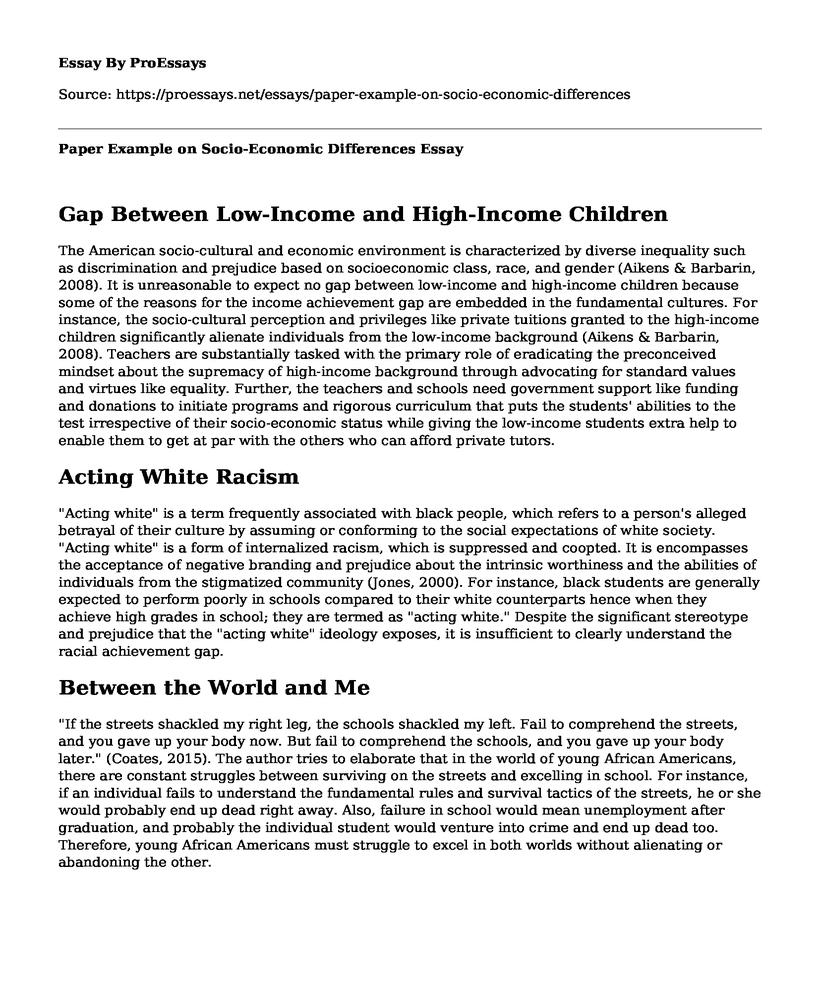Gap Between Low-Income and High-Income Children
The American socio-cultural and economic environment is characterized by diverse inequality such as discrimination and prejudice based on socioeconomic class, race, and gender (Aikens & Barbarin, 2008). It is unreasonable to expect no gap between low-income and high-income children because some of the reasons for the income achievement gap are embedded in the fundamental cultures. For instance, the socio-cultural perception and privileges like private tuitions granted to the high-income children significantly alienate individuals from the low-income background (Aikens & Barbarin, 2008). Teachers are substantially tasked with the primary role of eradicating the preconceived mindset about the supremacy of high-income background through advocating for standard values and virtues like equality. Further, the teachers and schools need government support like funding and donations to initiate programs and rigorous curriculum that puts the students' abilities to the test irrespective of their socio-economic status while giving the low-income students extra help to enable them to get at par with the others who can afford private tutors.
Acting White Racism
"Acting white" is a term frequently associated with black people, which refers to a person's alleged betrayal of their culture by assuming or conforming to the social expectations of white society. "Acting white" is a form of internalized racism, which is suppressed and coopted. It is encompasses the acceptance of negative branding and prejudice about the intrinsic worthiness and the abilities of individuals from the stigmatized community (Jones, 2000). For instance, black students are generally expected to perform poorly in schools compared to their white counterparts hence when they achieve high grades in school; they are termed as "acting white." Despite the significant stereotype and prejudice that the "acting white" ideology exposes, it is insufficient to clearly understand the racial achievement gap.
Between the World and Me
"If the streets shackled my right leg, the schools shackled my left. Fail to comprehend the streets, and you gave up your body now. But fail to comprehend the schools, and you gave up your body later." (Coates, 2015). The author tries to elaborate that in the world of young African Americans, there are constant struggles between surviving on the streets and excelling in school. For instance, if an individual fails to understand the fundamental rules and survival tactics of the streets, he or she would probably end up dead right away. Also, failure in school would mean unemployment after graduation, and probably the individual student would venture into crime and end up dead too. Therefore, young African Americans must struggle to excel in both worlds without alienating or abandoning the other.
References
Aikens, N. & Barbarin, O. (2008). Socio-economic differences in reading trajectories: The contribution of family, neighborhood, and school contexts. Journal of Educational Psychology, 100(2), 235-251.
Coates, T. N. (2015). Between the world and me. Text publishing.
Jones, C. P. (2000). Levels of racism: A theoretic framework and a gardener's tale. American Journal of Public Health, 90(8), 1212.
Cite this page
Paper Example on Socio-Economic Differences. (2022, Aug 12). Retrieved from https://proessays.net/essays/paper-example-on-socio-economic-differences
If you are the original author of this essay and no longer wish to have it published on the ProEssays website, please click below to request its removal:
- Critical Analysis of Health Disparities by Race and Class: Why Both Matter
- Essay Sample on Professional Deontology or Ethics
- Essay Sample on 21st Century Digital Marketing Communication Tools
- Essay Sample on Claude Shannon and Warren Weaver's Model of Communication: Exploring Signal Transmission
- Essay Example on Music & Resistance: Curtis Mayfield's People Get Ready
- Family Influence on Socialization Essay Example
- Essay Sample on Exploring Cultural Bias and Cry for Freedom







